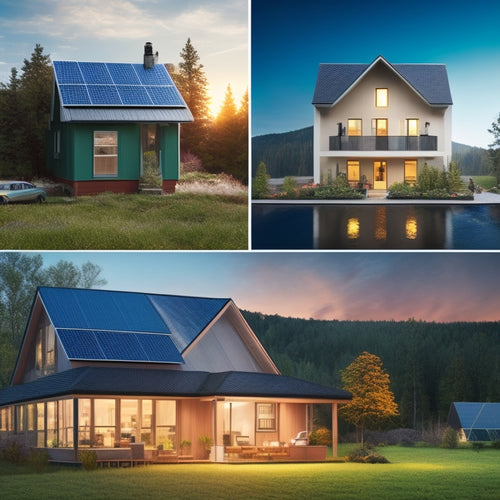
10 Top Appliance Rebates for Eco-Savvy Homeowners
Share
You're eligible for thousands of dollars in rebates and incentives when you upgrade to eco-friendly appliances and systems. Federal tax credits, state-specific programs, and utility company offers can greatly lower the cost of going green. Manufacturer rebates and Energy Star certified product incentives can also help. Plus, you can find rebates for water-saving appliances, high-efficiency HVAC systems, and smart home devices. And, municipal green appliance rebate programs and renewable energy certificates benefits might be available in your area. As you investigate these opportunities, you'll uncover even more ways to save money and reduce your carbon footprint.
Key Takeaways
- Federal tax credits offer up to 30% of eligible energy-efficient upgrades, while state-specific programs provide additional rebates for appliances and HVAC systems.
- Utility companies provide incentives for energy-efficient appliances, energy audits, and EV charging infrastructure, with federal incentives applicable in some cases.
- Manufacturer rebates are available for eco-friendly products, including smart thermostats, HVAC systems, and Energy Star certified appliances, which may also qualify for federal tax credits.
- Energy Star certified products help reduce carbon footprints and lower utility bills, with incentives available for upgrading to these products, including smart thermostats and solar panels.
- Municipal green appliance rebate programs offer additional incentives for energy-efficient appliance purchases, water-saving devices, and solar-powered appliances.
Federal Incentives for Energy Efficiency
As you commence your eco-friendly expedition, you'll be pleased to know that the federal government is offering a helping hand through various incentives for energy efficiency.
One significant perk is the federal tax credit, which allows you to claim a portion of your energy-efficient upgrades on your tax return. You can receive up to 30% of the total cost of eligible improvements, such as new windows, doors, and insulation.
Moreover, consider investing in energy audits, which can help identify areas in your home that need improvement. For instance, integrating clean energy solutions like solar panels can cut energy expenses by up to 50% and enhance charging efficiency.
In addition, the federal EV tax credit can save up to $7,500 on new EVs, making eco-friendly living more accessible. These audits can be partially funded by the federal government, making it even more accessible.
State-Specific Appliance Rebate Programs
You're likely to find that state-specific appliance rebate programs offer additional incentives to help offset the cost of eco-friendly upgrades. These programs vary by state, but they often provide rebates for energy-efficient appliances, HVAC systems, and insulation.
For instance, businesses and organizations can benefit from Government Financial Incentives for Electric Vehicles to reduce their carbon footprint and operating costs. Similarly, homeowners can investigate state-level incentives for electric vehicles, such as rebates and tax credits, to make eco-friendly upgrades more affordable.
To take advantage of these programs, you'll need to check rebate eligibility and follow the application process for your state. Some state programs offer rebates for specific products, like Energy Star-certified appliances, while others provide incentives for whole-home upgrades.
Be sure to research the programs available in your state to maximize your savings. By combining state programs with federal incentives, you can greatly reduce the cost of your eco-friendly upgrades and enjoy a more sustainable home.
Utility Company Offers and Discounts
How can you tap into additional savings on your eco-friendly upgrades? Your utility company may have offers and discounts that can help.
Many utility companies provide incentives for homeowners who invest in energy-efficient appliances and systems. Additionally, you may be eligible for federal incentives, such as tax credits, for installing EV charging infrastructure Federal EV Charging Incentives and other sustainable transportation solutions.
For instance, some utility companies offer rebates for energy audits, which can help you identify areas in your home where energy is being wasted. You may also be eligible for utility bill savings through programs that reward energy-efficient behavior.
Check with your utility company to see what offers are available in your area. By taking advantage of these incentives, you can maximize your savings and enjoy even greater freedom from high energy bills.
Manufacturer Rebates for Green Appliances
You can also investigate manufacturer rebates for green appliances, which offer incentives for choosing eco-friendly products.
Many manufacturers provide discounts on energy-efficient appliances, rewarding you for reducing your carbon footprint.
Green Tech Incentives Offered
Major manufacturers are now stepping up to the plate, offering rebates and incentives to homeowners who opt for eco-friendly appliances. You can take advantage of these offers to upgrade your home with sustainable appliance innovations that align with the latest green technology trends.
Many of these eco-friendly appliances also qualify for federal tax credits, such as the electric vehicle tax credits, which can greatly lower the overall cost of purchasing an environmentally friendly product. Rebates on energy-efficient refrigerators and washing machines from brands like Whirlpool and LG, discounts on smart thermostats and HVAC systems that learn your schedule and preferences, cashback offers on solar-powered water heaters and appliances with high Energy Star ratings, and free installation and recycling of old appliances with the purchase of new, eco-friendly models.
Eco-Friendly Product Discounts
One eco-friendly homeowner's delight is the array of discounts available from manufacturers on green appliances. You can enjoy significant savings on sustainable product options that align with your eco-conscious shopping habits.
Many manufacturers offer rebates on energy-efficient appliances, such as refrigerators, dishwashers, and washing machines. By integrating renewable energy integration, homeowners can reduce their reliance on the grid and lower their energy bills, further maximizing their savings.
These discounts can be combined with other incentives, like tax credits, to maximize your savings. By choosing eco-friendly appliances, you're not only reducing your carbon footprint but also saving money in the long run.
Take advantage of these manufacturer rebates to upgrade your home with sustainable products that benefit both you and the environment.
Energy Efficiency Rewards
Upgrading to eco-friendly appliances can be a costly undertaking, but manufacturers are incentivizing the switch with attractive rebates.
You can save big on sustainable living solutions, from refrigerators to washing machines, by taking advantage of these energy efficiency rewards. By choosing eco-friendly appliances, you're not only reducing your carbon footprint but also scoring significant savings.
-
Look for rebates on Energy Star-certified appliances, which meet strict energy efficiency guidelines.
-
Check manufacturer websites for promotions and discounts on eco-friendly models.
-
Combine manufacturer rebates with government incentives for eco-friendly renovations.
- Some utility companies also offer rebates for energy-efficient appliances, so be sure to investigate those options as well.
Energy Star Certified Product Incentives
You're likely considering energy-efficient upgrades to reduce your carbon footprint and lower your utility bills.
Energy Star certified products can help you achieve these goals, and rebate programs can sweeten the deal.
Energy Efficient Upgrades
Energy-efficient appliances are an essential step in reducing your home's carbon footprint, and the good news is that making the switch can also save you money.
By upgrading to Energy Star certified products, you'll not only minimize your environmental impact but also lower your energy bills.
Consider the following energy-efficient upgrades to maximize your savings:
- Solar panel installations to utilize renewable energy and reduce your reliance on the grid
- Home insulation upgrades to prevent heat loss and keep your home cozy
- Energy-efficient HVAC systems to regulate your home's temperature without breaking the bank
- Smart thermostats to optimize your heating and cooling usage based on your schedule and preferences
Rebate Program Benefits
As you make the switch to Energy Star certified products, you'll not only reduce your environmental impact but also reap financial rewards through rebate programs.
These incentives can greatly offset the cost of your eco-friendly upgrades. To take advantage of these rebates, you'll need to verify rebate eligibility by purchasing certified products and meeting program requirements.
The application process typically involves submitting proof of purchase and installation, along with other documentation.
Smart Home Device Rebate Opportunities
While upgrading to a smart home can seem like an intimidating task, many utility companies and government agencies are now offering rebates to homeowners who invest in smart home devices that promote energy efficiency and reduce waste.
By taking advantage of these rebates, you can enjoy significant savings on your energy bills while also reducing your carbon footprint.
Some popular smart home devices that may be eligible for rebates include:
- Smart thermostats that learn your schedule and preferences to optimize heating and cooling, resulting in smart thermostat savings
- Voice assistant integration devices that allow you to control your home's temperature, lighting, and security with just your voice
- Energy monitoring systems that provide real-time feedback on your energy usage
- Smart plugs that can turn any appliance into a smart device, allowing you to control and schedule its usage remotely
Water-Saving Appliance Incentives
You're likely aware that water conservation is vital, and upgrading to water-saving appliances can make a significant impact.
When it comes to rebates, you'll find incentives for low-flow showerheads, eco-friendly washing machines, and water-efficient dishwashers that can help reduce your water consumption.
Low-Flow Showerheads
Every minute counts when it comes to conserving water, and installing low-flow showerheads is a simple yet effective way to do so.
You'll not only reduce your water usage but also save energy and lower your utility bills. Plus, many low-flow showerheads are designed to provide a satisfying shower experience without sacrificing water pressure.
Some benefits of low-flow showerheads include:
- Reducing your shower's water usage by up to 2.5 gallons per minute
- Qualifying for rebates and incentives from your water utility company
- Lowering your energy consumption by reducing the amount of hot water needed
- Contributing to a more sustainable future by conserving this precious resource
Eco-Friendly Washing Machines
When it comes to water conservation, the laundry room is another area where you can make a significant impact.
By switching to an eco-friendly washing machine, you're taking an essential step towards sustainable laundry practices. Look for machines with the ENERGY STAR certification, which indicates they meet energy and water efficiency standards set by the U.S. Environmental Protection Agency.
Additionally, opt for models made with eco-conscious materials, such as recycled plastics, to reduce waste and minimize environmental harm.
Many utility companies and government agencies offer rebates for energy-efficient washing machines, so be sure to research available incentives in your area.
With these eco-friendly machines, you'll not only reduce your water consumption but also lower your energy bills and carbon footprint.
Water-Efficient Dishwashers
Kitchen clean-up gets a whole lot greener with water-efficient dishwashers, an essential addition to your eco-friendly home.
By choosing a dishwasher with advanced energy saving features, you'll not only reduce your environmental footprint but also save on your utility bills.
-
Look for dishwashers with the ENERGY STAR label, ensuring they meet energy efficiency standards set by the U.S. Environmental Protection Agency.
-
Check the EnergyGuide label to compare the energy consumption of different models.
-
Opt for a dishwasher with a low water factor (WF), which measures water efficiency.
- Consider a model with a "light wash" or "eco-cycle" option, which uses less water and energy for lighter loads.
High-Efficiency HVAC System Rebates
Upgrading to a high-efficiency HVAC system can save you hundreds of dollars on energy bills each year.
You'll enjoy significant energy savings, and with proper maintenance, your system will last longer and perform better.
Look for systems with high SEER (Seasonal Energy Efficiency Ratio) and AFUE (Annual Fuel Utilization Efficiency) ratings to maximize your savings.
Many utility companies and government agencies offer rebates for high-efficiency HVAC systems, ranging from a few hundred to several thousand dollars.
Be sure to check with local and national programs, such as the ENERGY STAR Certification, to see what incentives are available in your area.
Municipal Green Appliance Rebate Programs
In addition to federal and state incentives, many municipalities offer their own green appliance rebate programs, providing you with even more opportunities to save money on eco-friendly upgrades.
These local initiatives can help you offset the cost of energy-efficient appliances, making it easier to make sustainable choices for your home.
-
Check with your local government to see if they offer rebates for energy-efficient appliances, such as Energy Star certified products.
-
Look for community programs that provide incentives for reducing energy consumption, like smart thermostat installations.
-
Some municipalities offer rebates for water-saving appliances, like low-flow showerheads and toilets.
- You may also find programs that provide discounts on solar-powered appliances and systems.
Renewable Energy Certificates Benefits
You've investigated municipal green appliance rebate programs, and now you're looking to maximize your eco-friendly investments.
Renewable Energy Certificates (RECs) are a great way to do just that. RECs represent the environmental attributes of one megawatt-hour of renewable energy, such as wind or solar power.
By investing in RECs, you're supporting the development of renewable energy projects, reducing your carbon footprint, and promoting sustainability certifications. This renewable energy investment not only helps the environment but also increases your property value.
Additionally, many utilities and governments offer incentives for REC holders, providing a potential return on your investment.
Frequently Asked Questions
Can I Combine Multiple Rebates for a Single Appliance Purchase?
You're on a mission to maximize your savings, and rightly so! When it comes to rebate stacking, you'll need to check the eligibility criteria for each offer to guarantee you can combine them for a single appliance purchase - don't assume, always verify!
How Long Do I Have to File for a Rebate After Purchase?
You've got a limited time to file for a rebate after purchase, typically 30 to 90 days, so don't delay; check the rebate submission deadlines for your eligible appliance models to guarantee you don't miss out on your cash back.
Are Rebates Available for Recycled or Used Appliances?
Are you wondering if your eco-friendly efforts will pay off? Unfortunately, rebates typically aren't available for recycled or used appliances, but you can investigate local recycling programs and appliance upgrades to maximize your eco-impact and potential savings.
Do Rebates Apply to Appliances for Rental Properties?
You're wondering if rebates apply to appliances for rental properties. Generally, rental regulations affect rebate eligibility, but you'll need to check with local authorities to determine if you, as a landlord, qualify for rebates on energy-efficient upgrades.
Can I Receive a Rebate if I'm Not the Primary Utility Account Holder?
You're wondering if you can still get a rebate if you're not the primary utility account holder. Check the rebate eligibility criteria; some programs allow non-primary account holders to apply, while others don't, so you'll need to review the specific rules.
Related Posts
-

What Does Your Home Energy Audit Report Reveal?
Your home energy audit report reveals a detailed analysis of your energy consumption patterns, highlighting areas of ...
-

Why EVs Inspire Earth-Conscious Home Design Choices
As you shift to an electric vehicle, you're not just switching to a greener ride, you're igniting a broader commitmen...
-

10 Powerful Electric Mowers for Expansive Lawns
You're moving away from gas-powered mowers and exploring electric options for your expansive lawn. You'll find that h...


